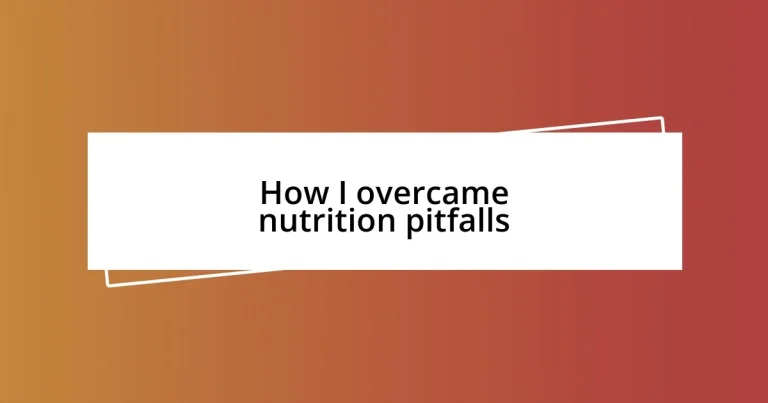Key takeaways:
- Recognizing nutrition pitfalls, such as misleading low-fat labels and the all-or-nothing mindset, is essential for making healthier choices.
- Developing sustainable meal planning and incorporating healthy habits, like hydration and mindful snacking, can enhance overall well-being.
- Celebrating small victories and reflecting on progress are crucial for maintaining motivation and ensuring a long-term commitment to better nutrition.
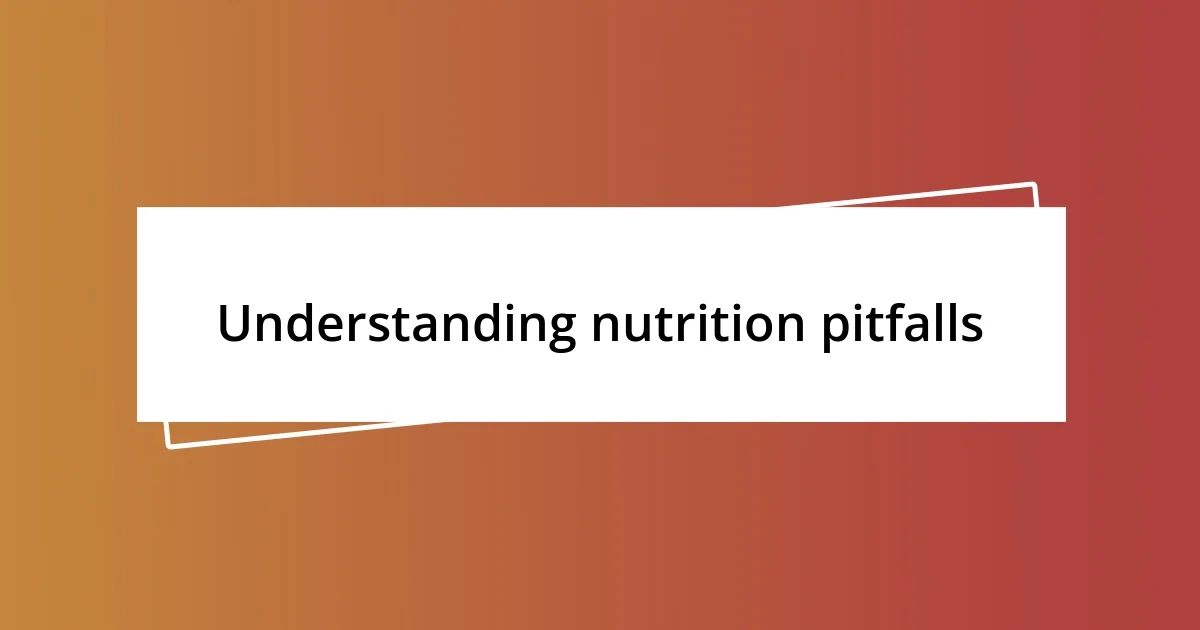
Understanding nutrition pitfalls
Nutrition pitfalls can sneak up on even the most well-intentioned individuals. I remember a time when I believed that low-fat options were the healthier choice. It was a shock when I learned they often contained added sugars and unhealthy additives instead. How often do we prioritize marketing labels over real ingredients, thinking we’re making the right choice?
Another common pitfall I’ve encountered is the all-or-nothing mindset around diets. For a long time, I thought that if I couldn’t stick to strict rules, I might as well abandon my goals entirely. The emotional rollercoaster of guilt after a “slip” fed into a cycle of unhealthy eating habits. What if, instead of aiming for perfection, we focused on progress and small, sustainable changes?
Then there’s the issue of portion control, which I struggled with whenever eating out. It was easy to ignore reasonable serving sizes, especially in restaurants where plates are piled high. Have you ever finished your meal just because it was in front of you, even when you were full? I’ve been there, and that realization made me rethink the importance of listening to my body’s cues.
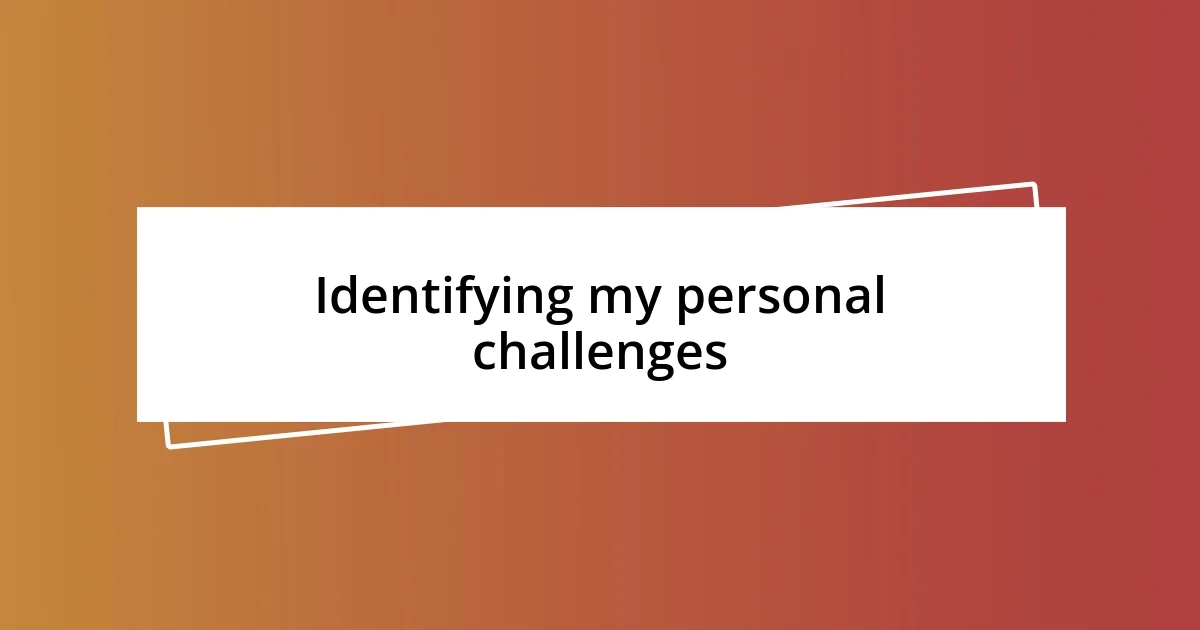
Identifying my personal challenges
Identifying my personal challenges
I’ve always struggled with snacking, especially late at night. Those moments when the kitchen temptations call to me are all too familiar. I remember a night when I mindlessly munched on chips while watching TV, only to realize I had consumed more than half the bag. It was eye-opening to see how my habits were often driven by boredom rather than hunger, leading me to examine my emotional connection to food.
Meal prep was another hurdle for me. Initially, I found it overwhelming to carve out time each week to plan and prepare meals. I constantly brushed it off until one Sunday afternoon turned into a frantic dash to prepare something healthy for the week ahead. It wasn’t just about cooking; it was about taking control of my choices. I learned that a little planning could reduce stress significantly and pave the way for healthier decisions throughout the week.
Lastly, I noticed a significant challenge in my ability to read food labels effectively. At first, I would glance at the calorie count and overlook the fine print filled with preservatives and additives. There was one instance when I bought a supposedly healthy granola bar, only to find it had more sugar than a candy bar! It taught me to dig deeper into ingredient lists and nutrition facts, fostering a greater awareness of what I was truly consuming.
| Challenge | Personal Experience |
|---|---|
| Snacking Habits | Late-night chip munching led me to realize my emotional ties to food. |
| Meal Prep | I once felt overwhelmed, but dedicated planning transformed my week. |
| Reading Labels | A healthy granola bar was a sugar trap, underscoring the need for vigilance. |
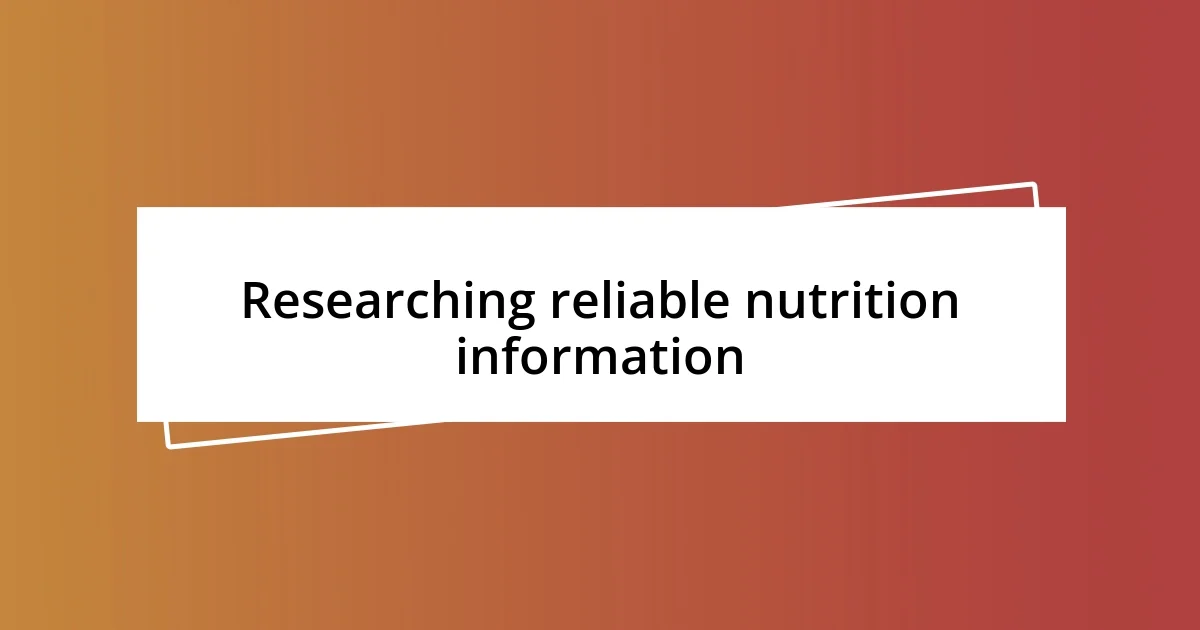
Researching reliable nutrition information
When it comes to nutrition, sorting through the avalanche of information can feel daunting. I’ve found that the first step is to identify credible sources—those backed by science and reputable experts. I often turn to registered dietitians or well-respected nutrition organizations. They cut through the noise, illuminating what truly matters when it comes to nourishing our bodies.
Here are a few reliable sources I trust:
- Registered Dietitians (RDs): They combine education with practical strategies tailored to individual needs.
- Government Websites: Sites like the USDA provide evidence-based dietary guidelines.
- Peer-Reviewed Journals: These publications often feature the latest research in nutrition.
- Reputable Books: Look for authors with advanced degrees in nutrition or related fields.
I remember feeling disoriented in the grocery store, overwhelmed by the conflicting nutrition claims everywhere. To ground myself, I began to scrutinize the research behind popular diet trends. This not only enriched my understanding but also empowered my choices. Instead of blindly following fads, I learned to discern what truly works for my body. This transformation was liberating—it meant finally stepping out of the noise and into tailored, informed decisions.
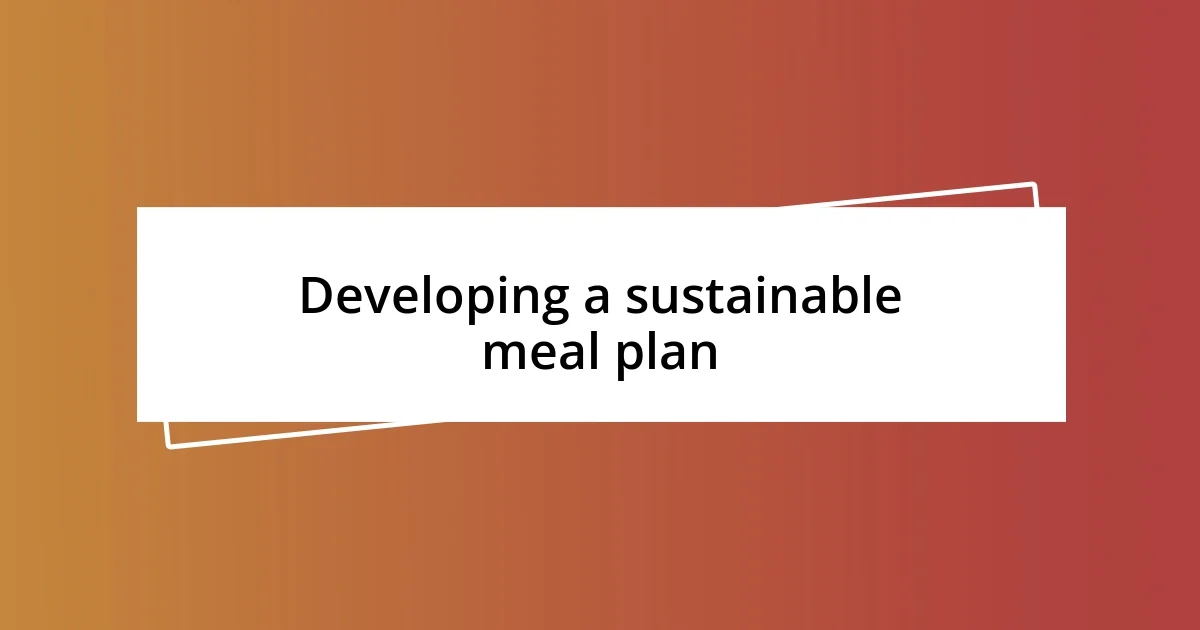
Developing a sustainable meal plan
When I decided to develop a sustainable meal plan, my first step was to create a list of my favorite meals that fit into a healthier framework. I remember scribbling down ideas in a notebook, really thinking about what I enjoyed eating, and not just what I thought I should be eating. This wasn’t about depriving myself; it was about rediscovering flavors I loved while making them a bit more nutritious.
As I started meal prepping, there were certainly moments of unease when I faced the daunting task of cooking for the week ahead. I vividly recall one of my first attempts when I overestimated my abilities and ended up with way too much quinoa! Instead of seeing it as a waste, I recognized it as an opportunity to embrace creativity. That extra quinoa became the base for tasty salads, a filling breakfast bowl, and even a topping for soup. Pretty soon, I realized that the more I prepped, the easier it was to make nourishing choices throughout the week.
I also found that having a flexible meal plan was crucial. Life gets busy, and I needed a system that adapted to my schedule, rather than one that required me to adhere strictly to rules. There were days when a planned stir-fry turned into a quick smoothie because I was running late. But instead of feeling guilty, I began to appreciate the variety—after all, isn’t nutrition about finding that balance? Thinking back to my journey, I can’t help but wonder: isn’t sustainability in our food choices just as much about enjoyment and flexibility as it is about rigid planning?
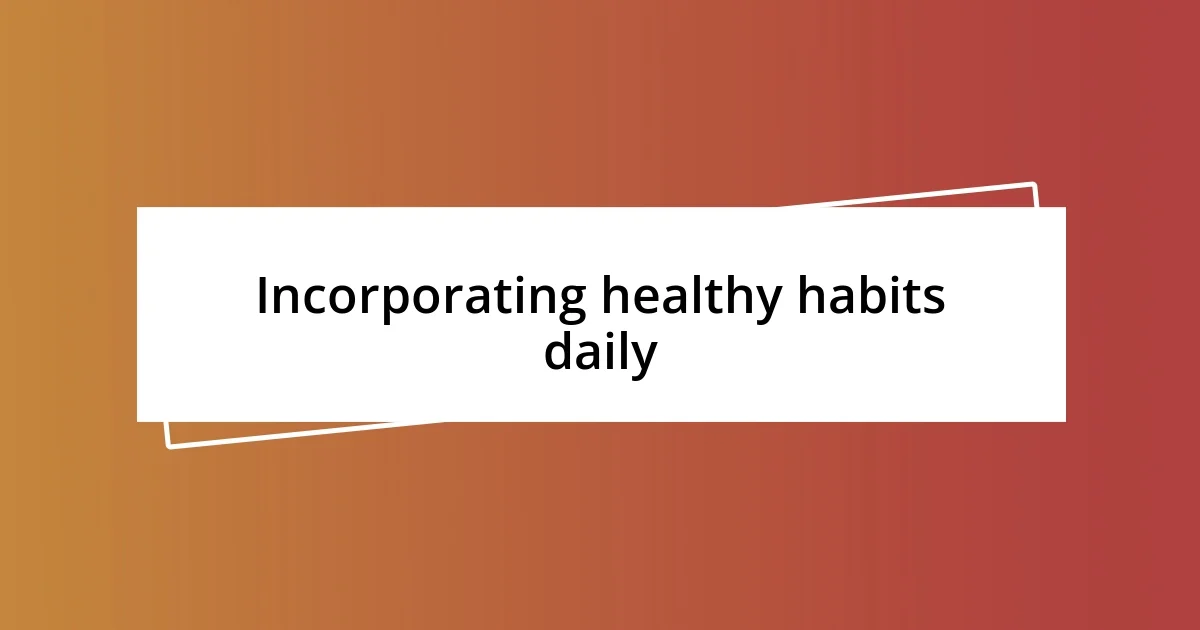
Incorporating healthy habits daily
Incorporating healthy habits into my daily routine didn’t happen overnight; it was a gradual journey. I began by starting each day with a glass of water—as simple as it sounds, it made a world of difference for my energy levels. I can still recall the refreshing feeling of hydrating first thing in the morning, like a gentle nudge to kickstart my day. Have you ever tried it? It’s amazing how such a small action can set the tone for healthier choices throughout the day.
I also made it a point to take short walks during my breaks. Initially, I didn’t believe a simple stroll could influence my overall well-being. However, I was pleasantly surprised. Those brief moments outside not only cleared my mind but also motivated me to make healthier food choices afterward. I remember one sunny afternoon when I returned from a walk, feeling invigorated and craving a crisp salad instead of my usual snack. It made me realize that it’s often in those little changes that we find a pathway to better nutrition.
Finding ways to incorporate these healthy habits into my life was key to their longevity. I started experimenting with smoothie recipes, blending different fruits and greens to create vibrant, nutrient-packed drinks. One memorable morning, I threw together spinach, banana, and some almond milk. The bright green backdrop contrasted beautifully with the luscious yellow, making it feel like a treat rather than a health obligation. Isn’t it fascinating how presenting food in a delightful way can increase our motivation to eat better? It’s experiences like these that make nutrition feel less like a chore and more like a celebration of what our bodies truly crave.
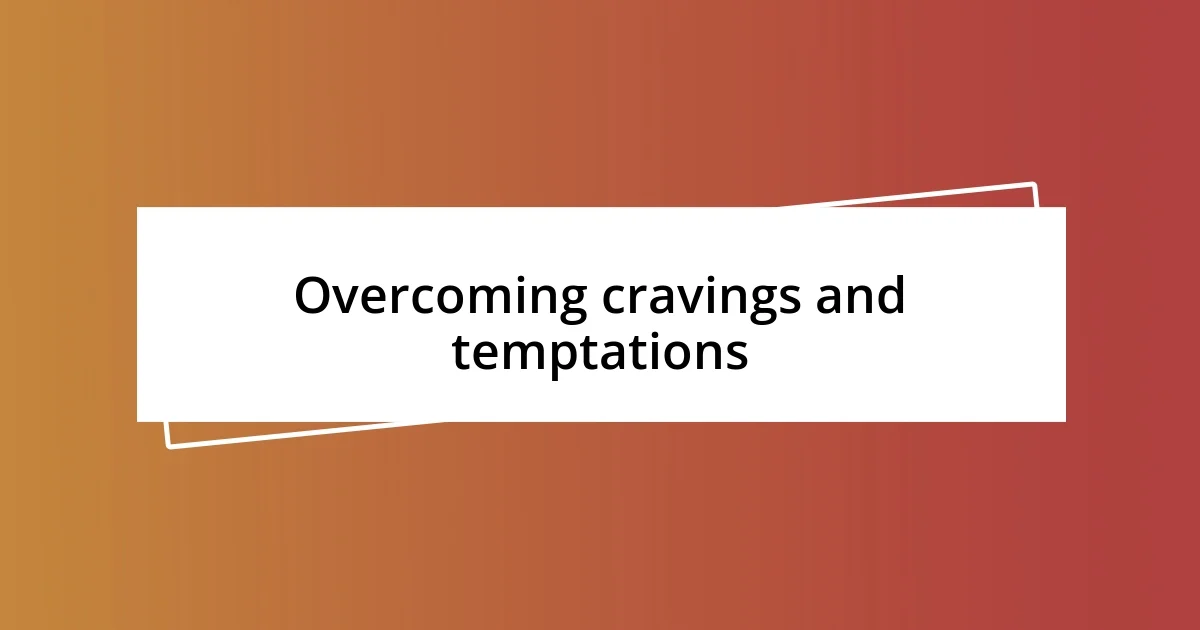
Overcoming cravings and temptations
Overcoming cravings and temptations was one of my biggest hurdles. I remember sitting on the couch, a box of cookies calling my name like a siren’s song. Instead of giving in, I started to challenge myself with questions: “What am I really craving? Is it sweetness, or am I just bored?” This small shift in perspective made a huge difference. Often, I found that after a glass of water or a piece of fruit, those intense cravings would fade, revealing that it wasn’t about the cookies at all.
There were days when temptations felt overwhelming, especially during stressful moments. One particular evening, after a long day, I found myself staring at the pantry, longing for something crunchy and salty. So, instead of diving into the chips, I prepped some homemade roasted chickpeas with spices. The first bite was incredibly satisfying, and that crunch hit the spot perfectly. This experience taught me that satisfying my cravings doesn’t mean succumbing to unhealthy choices; it can also lead me to make fun and nourishing alternatives.
I’ve also learned the power of being prepared. I recall a time when I had a busy week ahead and took an afternoon to chop veggies and portion healthy snacks. When cravings struck, instead of reaching for the usual high-calorie options, I found myself reaching for carrot sticks with hummus or whole-grain crackers. It was a game-changer! Isn’t it interesting how a little prep work can transform a potentially indulgent moment into a nourishing choice? Each time I choose wisely, I feel a surge of pride, reinforcing my commitment to better nutrition.
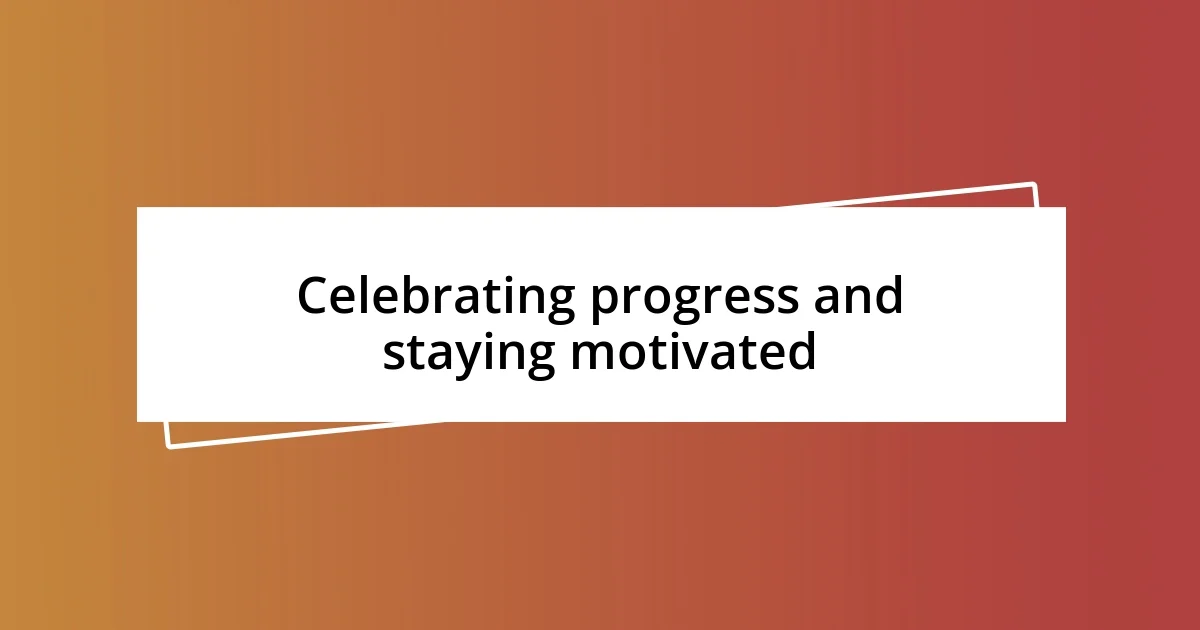
Celebrating progress and staying motivated
Celebrating progress on my journey was crucial in keeping my motivation alive. I remember the day I realized that I had replaced soda with sparkling water consistently—I felt an exhilarating rush! Documenting these little victories, like tasting a new healthy recipe or sticking to my meal plan for a week, helped me appreciate what I was achieving. Have you ever taken a moment to acknowledge your small wins? These milestones can fuel our drive to push further.
Staying motivated often meant surrounding myself with reminders of my goals. I started a habit of keeping a journal where I noted my thoughts and feelings about my choices. One entry stands out: I described the sheer joy of preparing a nourishing meal after a long day; the colors of the ingredients felt like a canvas I was painting on. When I reread those moments, it reignites that spark of motivation. Isn’t it amazing how reflecting on our progress can serve as a source of inspiration to continue?
I discovered that celebration doesn’t always need to be grand. Sometimes, it was as simple as treating myself to a relaxing evening after a week of healthy eating. One night, I savored a homemade fruit sorbet while watching my favorite show, feeling proud of the choices that led to that moment. This balance of enjoyment and accountability has proven invaluable to me. How do you reward yourself for your progress? Celebrating those moments keeps the journey enjoyable and reminds me that I’m on the right path.












